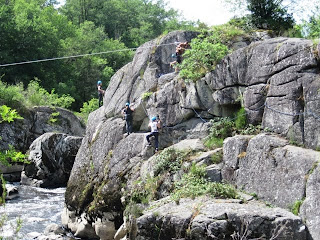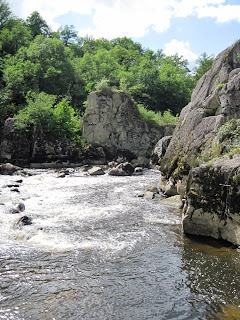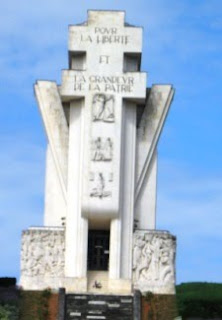 We set out early one morning and headed to the far eastern border. To get there, we passed the birthplace of Mme. de Montespan, the most influential of Louis XIV's mistresses and la Ferme Acadienne (the Acadian Farm), a memorial to the Acadiens who returned to this area, havng been expelled from Nova Scotia in 1774. We skirted Poitiers, the old capital (and scene of our French Visa interview) and moved from flat, seaside geography to rolling hills and rich farmland. After about 200 km, we were in Angle-sur-L'Anglelin, one of the prettiest villages in France.With its ruined castle high above the winding streets and squares of the upper and lower villages, it was indeed very pretty. We wandered around, had a delicious lunch and
We set out early one morning and headed to the far eastern border. To get there, we passed the birthplace of Mme. de Montespan, the most influential of Louis XIV's mistresses and la Ferme Acadienne (the Acadian Farm), a memorial to the Acadiens who returned to this area, havng been expelled from Nova Scotia in 1774. We skirted Poitiers, the old capital (and scene of our French Visa interview) and moved from flat, seaside geography to rolling hills and rich farmland. After about 200 km, we were in Angle-sur-L'Anglelin, one of the prettiest villages in France.With its ruined castle high above the winding streets and squares of the upper and lower villages, it was indeed very pretty. We wandered around, had a delicious lunch and  set off again for a geological site: Les Portes d'Enfer (the Gates of Hell). We wanted to see where the soft, white calcite rock of our area turns to the granite of central France. We enjoyed a hike through the forest at the edge of the Gartempe River, clambering over real granite again, remembering hikes in Ontario. At the Portes d'Enfer, we found a camp group of teenagers, rock climbing the precipice over the white water. I watched with admiration as a group of early adolescent girls made their way along the steep rock. On our way down, I said to one that I had admired her courage, perhaps I would have refused to do it myself. "Ah, non," she said matter of factly, "they make us do it. We have to." And like teenaged girls everywhere, her friends clustered around her as I walked on: "What did she say? What did she say?"
set off again for a geological site: Les Portes d'Enfer (the Gates of Hell). We wanted to see where the soft, white calcite rock of our area turns to the granite of central France. We enjoyed a hike through the forest at the edge of the Gartempe River, clambering over real granite again, remembering hikes in Ontario. At the Portes d'Enfer, we found a camp group of teenagers, rock climbing the precipice over the white water. I watched with admiration as a group of early adolescent girls made their way along the steep rock. On our way down, I said to one that I had admired her courage, perhaps I would have refused to do it myself. "Ah, non," she said matter of factly, "they make us do it. We have to." And like teenaged girls everywhere, her friends clustered around her as I walked on: "What did she say? What did she say?"
We spent the night in Confolens on an uncomfortable but beautiful bed and woke up to have a rvietting breakfast conversation with our hostess, an English woman who had lived there for over 10 years and an English couple who wanted to live there. After breakfast, I predicted some difficulties for them! Their knowledge of French was so minimal that she pronounced les as less; they had no knowledge of French politics or social life and their relationship seemed quite frail: she treated him like a child and he rolled his eyes at her remarks. Later our hostess told me she and her family were thinking of leaving Confolens as there were now so many British it just wasn't the same. On our evening stroll, we passed a British pub serving bangers and mash, a store called the Best of British and in the B and B found three different expat magazines just for the area!!!! It seems there are now over 100,000 British living in France. We wondered how many of them are integrated into the local French life and what impact their presence is having on local culture. Heading out that morning we discovered by chance, the memorial to the Resistance dead.
And then we were off to the grand and historic Château de Larochefoucauld, owned and lived in by the same family for centuries; home of the 17th century writer of maxims and potential home to a new project by the famous Chinese architect, M. Pei, who designed the Pyramid at the Louvre.
The donjon collapsed quite recently. In keeping with the family tradition of adding a new style of architecture every few hundred years, M. Pei was asked to reconstruct it. The plan is for a glass addition. It will house a virtual library and part of the chateau will become a school of architecture. Sadly, the townsfolk are not pleased and want the donjon restored to its ancient style. The LaRochefoucauld family is extensive and has had its hand in French history for
centuries.
François IV wrote his Maximes in this delightful small room. Much later, his descendant, Edmée, worked very hard to bring French women the vote in 1944. Later, driving through very rich agricultural land full of vines, we were more struck by the beauty of the fields and fields of sunflowers than the vines. They stretched sometimes for a kilometre, holding their yellow faces to the east.
And then we were off to our own château for the night--Le Château de la Tillade, owned and operated by the Vicomte and Vicomtesse de Talbert. We found charming hosts, interesting conversation and history over a glass of Pineau from their farm when we arrived. Upstairs a very comfortable bedroom waited.
 Off to dinner in the local town, Pons, once a thriving centre on the pilgrims route to Santiago. Because of this, a large centre was built that is now a museum. I suspect that our meal at the Hotel de Bordeaux was a cut above those of the pilgrims: baked mullet, M. Guilbeau's pigeon, warm homemade bread, wine of the region, chocolate/caramel cake and crème brulée. We are always amazed to find such wonderful restaurants in the country, serving fine food, cooked with care and creativity. How we will miss this at home in Ontario!
Off to dinner in the local town, Pons, once a thriving centre on the pilgrims route to Santiago. Because of this, a large centre was built that is now a museum. I suspect that our meal at the Hotel de Bordeaux was a cut above those of the pilgrims: baked mullet, M. Guilbeau's pigeon, warm homemade bread, wine of the region, chocolate/caramel cake and crème brulée. We are always amazed to find such wonderful restaurants in the country, serving fine food, cooked with care and creativity. How we will miss this at home in Ontario!
Our lunch the following day in the historic town of Santes was equally good and atmospheric as we sat by the river overlooking the ancient Roman Arch.
 And then it was back to La Rochelle, our last drive up the Autoroute at 130 km/hr. For the first time, our drive through the old centre to Rue des Bonnes Femmes was faultless. We have finally learned the tortured one way system for cars! And we were chez nous, back in lovely # 6. Were we home? More about the difference between those two words next week. Meanwhile, we are in the throes of packing and saying more goodbyes!
And then it was back to La Rochelle, our last drive up the Autoroute at 130 km/hr. For the first time, our drive through the old centre to Rue des Bonnes Femmes was faultless. We have finally learned the tortured one way system for cars! And we were chez nous, back in lovely # 6. Were we home? More about the difference between those two words next week. Meanwhile, we are in the throes of packing and saying more goodbyes!









